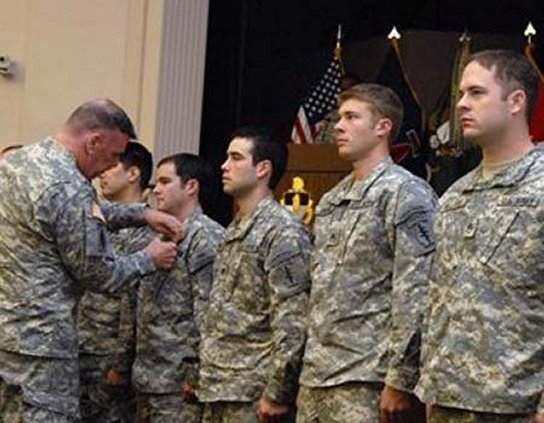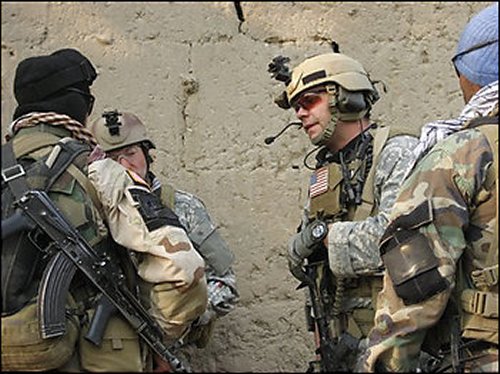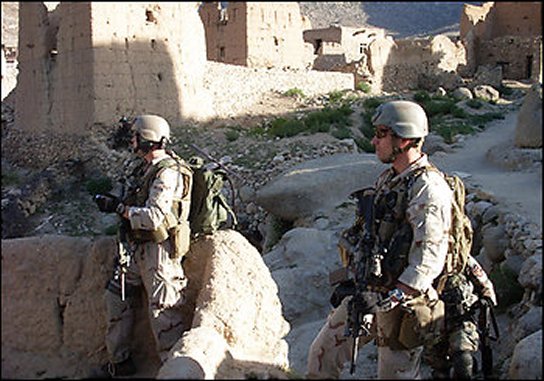« Blagojevich Fundraiser Held By Jesse Jackson Jr. | Main | Videos From Ohio State House To Save The Constitution »
December 13, 2008
Silver Star Record For Unit In Afghan Cliff Clash

Dec. 12, 2008 Lt. Gen. John F. Mulholland pins the Silver Star on one of 19 Fort Bragg Special Forces soldiers who were honored for their actions.

In this undated photo provided by the U.S. Army, Capt. Kyle Walton, right, and Master Sgt. Scott Ford, left, talk to an interpreter in Eastern Afghanistan. Both men will recieve a Silver Star Friday, Dec. 12, 2008 in the largest Special Forces award ceremony since the Vietnam War. (AP Photo/U.S. Army Photo, Sgt. David N Gunn) (Sgt. David N Gunn - AP)
Silver Star record for unit in Afghan cliff clash
"By the end of the six-hour battle deep within the Shok Valley, Walton would bear witness to heroics that on Friday would earn his team 10 Silver Stars, the most for a single battle in Afghanistan."
December 12, 2008
FORT BRAGG, N.C.
Capt. Kyle Walton remembers pressing himself into the jagged stones that covered the cliff in northeast Afghanistan.
Machine gun rounds and sniper fire ricocheted off the rocks. Two rounds slammed into his helmet, smashing his head into the ground. Nearby, three of his U.S. Army Special Forces comrades were gravely wounded. One grenade or a well-aimed bullet, Walton thought, could etch April 6, 2008 on his gravestone.
Walton and his team from the 3rd Battalion, 3rd Special Forces Group had been sent to kill or capture terrorists from a rugged valley that had never been penetrated by U.S. forces—or, they had been told, the Soviets before them.
He peered over the side of the cliff to the dry river bed 60 feet below and considered his options. Could he roll the wounded men off and then jump to safety? Would they survive the fall?
By the end of the six-hour battle deep within the Shok Valley, Walton would bear witness to heroics that on Friday would earn his team 10 Silver Stars, the most for a single battle in Afghaniston and possibly since the Vietnam War, although Army officials couldn't confirm that.
Army officials said an Air Force controller who guided air strikes from the ground was also nominated for a Silver Star but did not know if he had received it and Air Force officials couldn't immediately track down the case.
Walton, a Special Forces team leader, and his men described the battle in an interview with The Associated Press last week. Most seem unimpressed they've earned the Army's third-highest award for combat valor.
"This is the story about Americans fighting side-by-side with their Afghan counterparts refusing to quit," said Walton, of Carmel, Ind. "What awards come in the aftermath are not important to me."
The mission that sent three Special Forces teams and a company from the 201st Afghan Commando Battalion to the Shok Valley seemed imperiled from the outset.
Six massive CH-47 Chinook helicopters had deposited the men earlier that morning, banking through thick clouds as they entered the valley. The approaching U.S. soldiers watched enemy fighters racing to positions dug into the canyon walls and to sniper holes carved into stone houses perched at the top of the cliff.
Considered a sanctuary of the Hezeb Islami al Gulbadin terrorist group, the valley is far from any major American base.
It was impossible for the helicopters to land on the jagged rocks at the bottom of the valley. The Special Forces soldiers and commandos, each carrying more than 60 pounds of gear, dropped from 10 feet above the ground, landing among boulders or in a near-frozen stream.
With several Afghan commandos, Staff Sgt. John Walding and Staff Sgt. David Sanders led the way on a narrow path that zig-zagged up the cliff face to a nearby village where the terrorists were hiding.
Walton followed with two other soldiers and a 23-year-old Afghan interpreter who went by the name C.K., an orphan who dreamed of going to the United States.
Walding and Sanders were on the outskirts of the village when Staff Sgt. Luis Morales saw a group of armed men run along a nearby ridge. He fired. The surrounding mountains and buildings erupted in an ambush: The soldiers estimate that more than 200 fighters opened up with rifles, rocket-propelled grenades, machine guns and AK-47s.
C.K. crumbled to the ground.
Walton and Spc. Michael Carter dove into a small cave. Staff Sgt. Dillon Behr couldn't fit so the Rock Island, Ill., native dropped to one knee and started firing. An F-15 made a strafing run to push back the fighters, but it wasn't enough.
Sanders radioed for close air support—an order that Walton had to verify because the enemy was so near that the same bombs could kill the Americans.
The nearest house exploded; the firing didn't stop.
"Hit it again," Sanders said.
For the rest of the battle, F-15 fighters and Apache helicopters attacked.
Behr was hit next—a sniper's round passing through his leg. Morales knelt on Behr's hip to stop the bleeding and kept firing until he, too, was hit in the leg and ankle.
Walton and Carter, a combat cameraman from Smithville, Texas, dragged the two wounded men to the cave. Gunfire had destroyed Carter's camera so Walton put him to work treating Morales who, in turn, kept treating Behr.
Staff Sgt. Ronald J. Shurer, a medic from Pullman, Wash., fought his way up the cliff to help.
"Heard some guys got hit up here," he said as he reached the cave, pulling bandages and gear from his aid bag.
Walton told Walding and Sanders to abandon the assault and meet on the cliff. The Americans and Afghan commandos pulled back as the Air Force continued to pound the village.
Walding made it to the cliff when a bullet shattered his leg. He watched his foot and lower leg flop on the ground as Walton dragged him to the cliff edge. With every heartbeat, a stream of blood shot out of Walding's wound. Rolling on his back, the Groesbeck, Texas, native, asked for a tourniquet and cranked down until the bleeding stopped.
The soldiers were trapped against the cliff. Walton was sure his men would be overrun. The narrow path was too exposed. He sent Sanders to find another way down. Sometimes free-climbing the rock face, the Huntsville, Ala., native found a steep path and made his way back up. Could the wounded make it out alive? Walton asked.
"Yes, they'll survive," Sanders said.
Down below, Staff Sgt. Seth E. Howard took his sniper rifle and started climbing with Staff Sgt. Matthew Williams.
At the top, Howard used C.K.'s lifeless body for cover and started to shoot. He fired repeatedly, killing as many as 20 of their attackers, his comrades say. The enemy gunfire slowed. The Air Force bombing continued, providing cover.
Morales was first down the cliff, clutching branches and rocks as he slid. Sanders, Carter and Williams went up to get Behr, then back up to rescue Walding. As Walton climbed down, a 2,000-pound bomb hit a nearby house. Another strike nearly blew Howard off the cliff.
Helicopters swooped in to pick up the 15 wounded American and Afghan soldiers, as well as the rest of the teams. Bullets pinged off the helicopters. One hit a pilot.
All the Americans survived.
Months later, Walding wants back on the team even though he lost a leg. Morales walks with a cane.
The raid, the soldiers say, proved there will be no safe haven in Afghanistan for terrorists. As for the medals, the soldiers see them as emblems of teamwork and brotherhood. Not valor.
"When you go to help your buddy, you're not thinking, 'I am going to get a Silver Star for this,'" Walding said. "If you were there, there would not be a second guess on why."

Members of the Operational Detachment Alpha 3336 of the 3rd Special Forces Group endured a nearly seven-hour battle on a mountainside in Afghanistan's Nuristan province on April 6. (Courtesy Of Maj. Emanuel Ortiz Cruz)
From the Washington Post.............
10 Green Berets to Receive Silver Star for Afghan Battle
By Ann Scott Tyson
After jumping out of helicopters at daybreak onto jagged, ice-covered rocks and into water at an altitude of 10,000 feet, the 12-man Special Forces team scrambled up the steep mountainside toward its target -- an insurgent stronghold in northeast Afghanistan.
"Our plan," Capt. Kyle M. Walton recalled in an interview, "was to fight downhill."
But as the soldiers maneuvered toward a cluster of thick-walled mud buildings constructed layer upon layer about 1,000 feet farther up the mountain, insurgents quickly manned fighting positions, readying a barrage of fire for the exposed Green Berets.
A harrowing, nearly seven-hour battle unfolded on that mountainside in Afghanistan's Nuristan province on April 6, as Walton, his team and a few dozen Afghan commandos they had trained took fire from all directions. Outnumbered, the Green Berets fought on even after half of them were wounded -- four critically -- and managed to subdue an estimated 150 to 200 insurgents, according to interviews with several team members and official citations.
Today, Walton and nine of his teammates from Operational Detachment Alpha 3336 of the 3rd Special Forces Group will receive the Silver Star for their heroism in that battle -- the highest number of such awards given to the elite troops for a single engagement since the Vietnam War.
That chilly morning, Walton's mind was on his team's mission: to capture or kill several members of the Hezb-e-Islami Gulbuddin (HIG) militant group in their stronghold, a village perched in Nuristan's Shok Valley that was accessible only by pack mule and so remote that Walton said he believed that no U.S. troops, or Soviet ones before them, had ever been there.
But as the soldiers, each carrying 60 to 80 pounds of gear, scaled the mountain, they could already spot insurgents running to and fro, they said. As the soldiers drew closer, they saw that many of the mud buildings had holes in the foot-thick walls for snipers. The U.S. troops had maintained an element of surprise until their helicopters turned into the valley, but by now the insurgent leaders entrenched above knew they were the targets, and had alerted their fighters to rally.
Staff Sgt. Luis Morales of Fredericksburg was the first to see an armed insurgent and opened fire, killing him. But at that moment, the insurgents began blasting away at the American and Afghan troops with machine guns, sniper rifles and rocket-propelled grenades -- shooting down on each of the U.S. positions from virtually all sides.
"All elements were pinned down from extremely heavy fire from the get-go," Walton said. "It was a coordinated attack." The insurgent Afghan fighters knew there was only one route up the valley and "were able to wait until we were in the most vulnerable position to initiate the ambush," said Staff Sgt. Seth E. Howard, the team weapons sergeant.
Almost immediately, exposed U.S. and Afghan troops were hit. An Afghan interpreter was killed, and Staff Sgt. Dillon Behr was shot in the hip.
"We were pretty much in the open, there were no trees to hide behind," said Morales, who with Walton pulled Behr back to their position. Morales cut open Behr's fatigues and applied pressure to his bleeding hip, even though Morales himself had been shot in the right thigh. A minute later, Morales was hit again, in the ankle, leaving him struggling to treat himself and his comrade, he said. Absent any cover, Walton moved the body of the dead Afghan interpreter to shield the wounded.
Farther down the hill in the streambed, Master Sgt. Scott Ford, the team sergeant, was firing an M203 grenade launcher at the fighting positions, he recalled. An Afghan commando fired rocket-propelled grenades at the windows from which they were taking fire, while Howard shot rounds from a rocket launcher and recoilless rifle.
Ford, of Athens, Ohio, then moved up the mountain amid withering fire to aid Walton at his command position. The ferocity of the attack surprised him, as rounds ricocheted nearby every time he stuck his head out from behind a rock. "Typically they run out of ammo or start to manage their ammo, but . . . they held a sustained rate of fire for about six hours," he said.
As Ford and Staff Sgt. John Wayne Walding returned fire, Walding was hit below his right knee. Ford turned and saw that the bullet "basically amputated his right leg right there on the battlefield."
Walding, of Groesbeck, Tex., recalled: "I literally grabbed my boot and put it in my crotch, then got the boot laces and tied it to my thigh, so it would not flop around. There was about two inches of meat holding my leg on." He put on a tourniquet, watching the blood flow out the stump to see when it was tight enough.
Then Walding tried to inject himself with morphine but accidentally used the wrong tip of the syringe and put the needle in this thumb, he later recalled. "My thumb felt great," he said wryly, noting that throughout the incident he never lost consciousness. "My name is John Wayne," he said.
Soon afterward, a round hit Ford in the chest, knocking him back but not penetrating his body armor. A minute later, another bullet went through his left arm and shoulder, hitting the helmet of the medic, Staff Sgt. Ronald J. Shurer, who was behind him treating Behr. An insurgent sniper was zeroing in on them.
Bleeding heavily from the arm, Ford put together a plan to begin removing the wounded, knowing they could hold out only for so long without being overrun. By this time, Air Force jets had begun dropping dozens of munitions on enemy positions precariously close to the Green Berets, including 2,000-pound bombs that fell within 350 yards.
"I was completely covered in a cloud of black smoke from the explosion," said Howard, and Behr was wounded in the intestine by a piece of shrapnel.
The evacuation plan, Ford said, was that "every time they dropped another bomb, we would move down another terrace until we basically leapfrogged down the mountain." Ford was able to move to lower ground after one bomb hit, but insurgent fire rained down again, pinning the soldiers left behind.
"If we went that way, we would have all died," said Howard, who was hiding behind 12-inch-high rocks with bullets bouncing off about every 10 seconds. Insurgents again nearly overran the U.S. position, firing down from 25 yards away -- so near that the Americans said they could hear their voices. Another 2,000-pound bomb dropped "danger close," Howard said, allowing the soldiers to get away.
Finally, after hours of fighting, the troops made their way down to the streambed, with those who could still walk carrying the wounded. A medical evacuation helicopter flew in, but the rotors were immediately hit by bullets, so the pilot hovered just long enough to allow the in-flight medic to jump off, then flew away.
A second helicopter came in but had to land in the middle of the icy, fast-moving stream. "It took two to three guys to carry each casualty through the river," Ford said. "It was a mad dash to the medevac." As they sat on the helicopter, it sustained several rounds of fire, and the pilot was grazed by a bullet.
By the time the battle ended, the Green Berets and the commandos had suffered 15 wounded and two killed, both Afghans, while an estimated 150 to 200 insurgents were dead, according to an official Army account of the battle. The Special Forces soldiers had nearly run out of ammunition, with each having one to two magazines left, Ford said.
"We should not have lived," said Walding, reflecting on the battle in a phone interview from Fort Bragg, N.C., where he and the nine others are to receive the Silver Stars today.
Nine more Green Berets from the 3rd Special Forces Group will also receive Silver Stars for other battles. About 200 U.S. troops serving in Iraq and Afghanistan have received the Silver Star, the U.S. military's third-highest combat award.

Wild Thing's comment.......
Thank you God for not letting this be worse then what happened. American heroes all. I am in such awe of our military. Our guys did a fantastic job against tremendous odds.
 ....Thank you Les for sending this to me.
....Thank you Les for sending this to me.
Posted by Wild Thing at December 13, 2008 05:55 AM
Comments
Why don't they show this on tv? A whole unit getting silver stars for heroism. Kids would lap it up! I think it's God who saved them from utter annihilation, which should have happened.
These kids did what they had to do without a moment's notice. We should be very, very proud of them.
Posted by: Lynn at December 13, 2008 06:54 AM
When we pass by Arlington, Mannassas - Quantico, Fredericksburg and Petersburg, Ft. Bragg and Pope AFB on I-95 south, I tell my family this is sacred territory for freedom is not free! A damn shame the 3 P's - PC Pentagon Pukes - won't unleash the dogs of war and remove the dispicable 'Rules of NON-Engagement'... Where have you gone Harry Truman?
Posted by: darthcrUSAderworldtour07 at December 13, 2008 08:40 AM
All my heroes were American service men and women. My father, grandfathers, uncles and cousins fought in the Revolution, the Civil War, the Spanish-American war, and WWII. To try to deserve them I put in eight years in the Army Reserve and made ammunition and rockets for thirty-five. Once I could quote Mark Clark's great speech and MacArthur's "Duty, Honor, Country" speech. Now it is both sad and rewarding to have lived to see America with the greatest people in uniform in its history and the sorriest crop of Politicians ever. Not mine to understand, I guess. But think of what it would be like if we swapped the two groups. Can you imagine the Governor of Illinois in that line receiving a Silver Star?
Posted by: horace at December 13, 2008 09:49 AM
Special Forces have fought some rugged one sided battles in Afghanistan and Iraq. They have paid the price in some of these battles.
Special Forces normally keeps a low public profile, they call themselves "The Quiet Professionals". A lot of their work is sneak and peek intelligence gathering and a lot of it is the more political winning the hearts and minds of the local peoples.
It takes a long time to train an Army Special Forces trooper, but no other unit in the military has the wide range of capabilities of a Special Forces team.
Congratulations to Capt Walton and his A Team. Thanks and appreciation to all the military people who serve America today.
Posted by: TomR at December 13, 2008 11:20 AM
Thanks Chrissie and Les.
These special 12-man Special Forces A teams seldom get the recognition they deserve. Silvers are not simply granted, I'm sure some deserve higher honors. God bless them.
Posted by: Jack at December 13, 2008 01:17 PM
Yes, a special thanks to them all.
Posted by: Bob A at December 13, 2008 05:17 PM
Special Forces, very special indeed.
Posted by: Mark at December 13, 2008 05:26 PM
Lynn, it is shameful how the media just ignores these stories about our troops. I would love for someone like Oliver North to be given even a half hour time slot to do stories even once a week would be an improvement to the non stories now they are doing.
Posted by: Wild Thing at December 13, 2008 06:11 PM
Darth, I agree, it really isi " sacred territory".
Posted by: Wild Thing at December 13, 2008 06:13 PM
Horace, thank you so much for sharing about your family. Thank you Horace for serving our country. That is neat that you could quote Mark Clark's great speech and MacArthur's "Duty, Honor, Country" speech.
I agree Horace, I don't understand either how excellence and honor have disapeard from those serving in government office at all levels.
Posted by: Wild Thing at December 13, 2008 06:19 PM
Tom, thank you for that about Special Forces.
I read these stories and just sit here wishing so much to thank them all and tell them how proud America is of what they do and we are praying for them.
Posted by: Wild Thing at December 13, 2008 06:22 PM
Jack, yes it is an honor to post the story about them.
Posted by: Wild Thing at December 13, 2008 06:24 PM
Bob A.,. yes a very special thank you to them all.
America has been the greatest country and our military as well.
Posted by: Wild Thing at December 13, 2008 06:26 PM
Mark, I was thinking of Rhod's son when I saw this was about Special Forces.
Posted by: Wild Thing at December 13, 2008 06:32 PM
